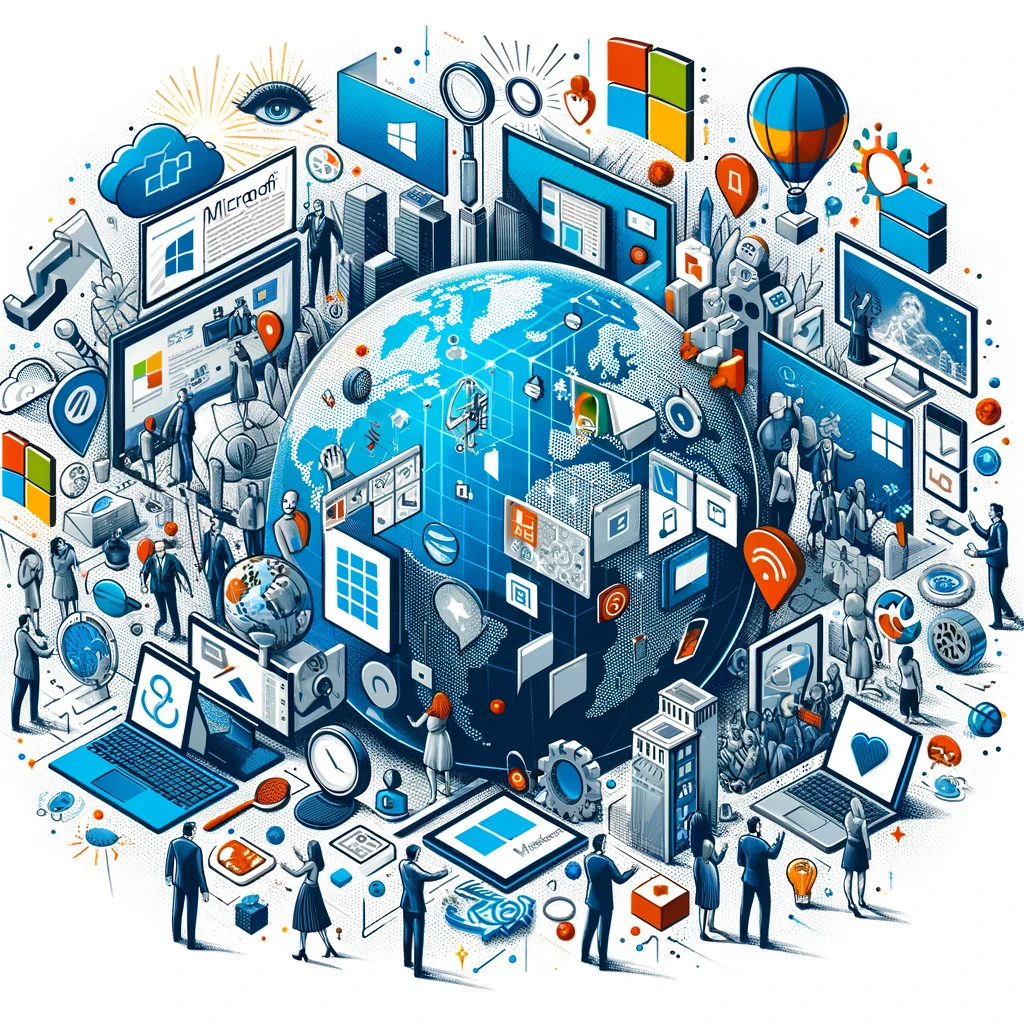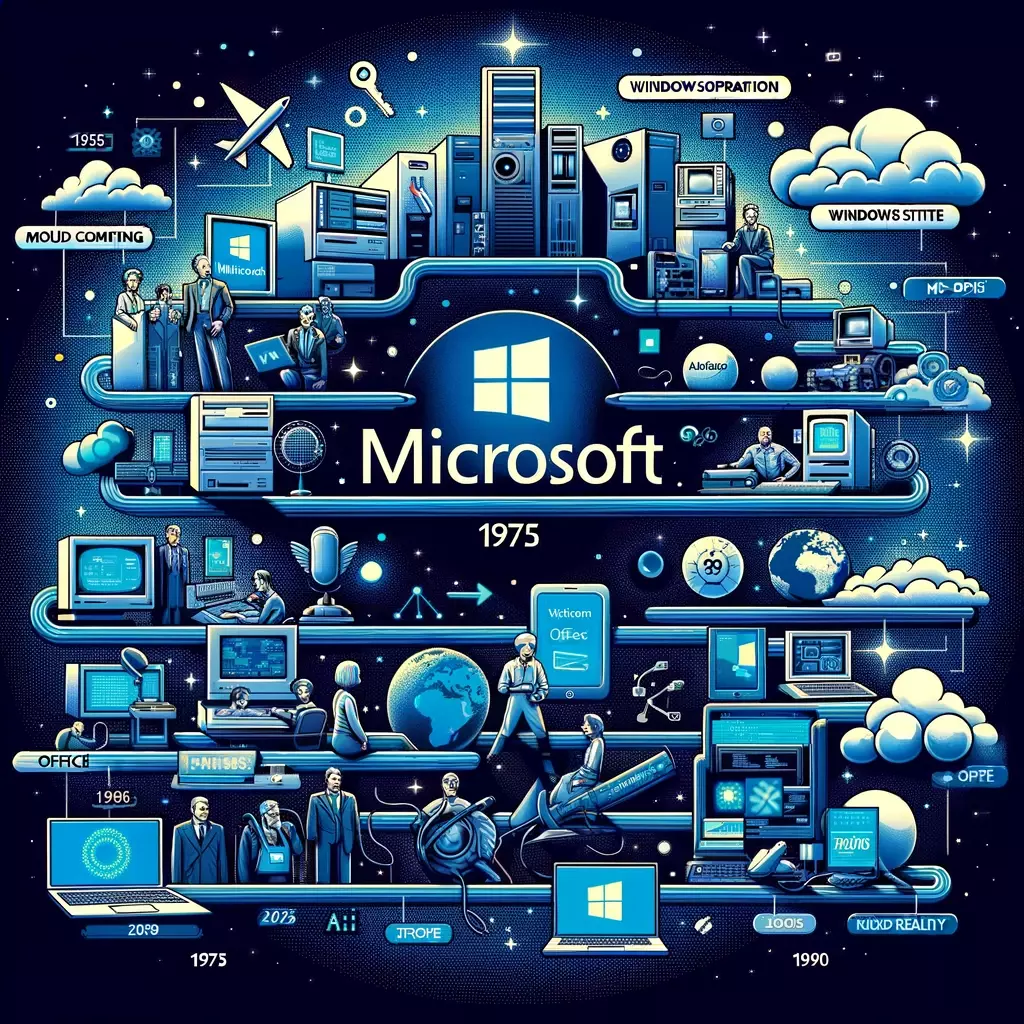Microsoft's marketing strategy is a multifaceted approach designed to position Microsoft as a leader in technology solutions for both consumers and businesses.
Microsoft's marketing strategy encompasses various techniques including direct marketing, a freemium pricing strategy, and a focus on digital transformation.
Let's dive into the different components that make Microsoft's marketing efforts successful and innovative.
What is Microsoft's Core Marketing Strategy?

Microsoft's marketing strategy focuses on leveraging its broad product portfolio, innovation, and partnerships to maintain and expand its market presence across various sectors including software, hardware, and cloud computing.
Microsoft's multifaceted approach ensures that they remain a dominant force in the technology industry.
Integrated Solutions
Cross-Platform Integration: Microsoft's consumer electronics are designed to work seamlessly across devices and platforms. For example, the Office suite is available on PCs, Macs, iOS, and Android devices, promoting a unified user experience.
Cloud Computing: Azure, Microsoft's cloud platform, is marketed as the backbone for digital transformation, enabling businesses to scale and innovate. Microsoft emphasizes Azure's hybrid capabilities, allowing integration with on-premises data centres.
Enterprise Focus
Tailored Solutions for Businesses: Microsoft develops solutions that cater specifically to enterprise needs, such as Microsoft 365 and Dynamics 365. These solutions are marketed as comprehensive packages that enhance productivity, collaboration, and business processes.
Professional Services and Support: Microsoft offers extensive support and consultancy services, ensuring businesses can effectively implement and utilize their products. This includes training, deployment support, and dedicated account management.
Consumer Engagement
Brand Loyalty Programs: Microsoft Rewards program incentivizes users to engage more deeply with Microsoft products, offering points for searches on Bing or purchases on the Microsoft Store.
Community Building: Through forums, user groups, and conferences like Microsoft Build, the company fosters a community around its products, encouraging feedback and direct user engagement.
Strategic Partnerships
Collaborations with Industry Leaders: Partnerships with companies like Adobe and SAP enhance Microsoft's product offerings, integrating various software solutions and expanding their utility.
Global Reach: By collaborating with telecommunications companies to promote and bundle Microsoft services, such as Office 365 with broadband services, Microsoft enhances its market penetration globally.
Innovation and Research
Cutting-Edge Technology: Microsoft invests heavily in research and development, focusing on areas like artificial intelligence, quantum computing, and mixed reality. Products like HoloLens are marketed not just as hardware but as gateways to new experiences and capabilities.
Beta Programs and Early Access: Microsoft encourages users to test early versions of software through its Insider programs. This not only helps in refining products but also builds anticipation and feedback loops with the tech community.
Content and Thought Leadership
Educational Content: Microsoft Learn and Microsoft Docs offer extensive resources, training, and documentation, positioning Microsoft as a thought leader in technology education.
Executive Visibility: Key figures like CEO Satya Nadella often speak on broader industry trends and Microsoft’s role in shaping the future of technology, reinforcing the brand's position as an industry leader.
Microsoft Teams’ Rapid Growth: Leveraged as a critical tool for remote work during the COVID-19 pandemic, Microsoft Teams was integrated deeply with other Microsoft services, showcasing the company's ability to quickly adapt and meet emerging customer needs.
Xbox Game Pass Subscription Service: This service revolutionized the gaming industry by offering access to a vast library of games across multiple devices, reinforcing Microsoft's commitment to value and innovation in consumer markets.
Microsoft marketing strategies are a testament to its ability to adapt, innovate, and lead in the technology sector. By balancing its efforts across product development, customer engagement, and strategic partnerships, Microsoft continues to solidify its position as a key player in the global tech landscape.
Microsoft's Evolution into a Tech Titan

Microsoft's journey as a global tech giant first began in 1975, marking the dawn of a new era in computing.
The company's strategic foresight in licensing its MS-DOS operating system to IBM, while retaining the rights to sell the software to other manufacturers, laid the groundwork for its dominance.
The launch of the Windows operating system revolutionized the PC industry, catapulting Microsoft into a leadership position.
Through relentless innovation and savvy marketing strategies, Microsoft expanded into office productivity software, cloud computing, and consumer electronics.
Microsoft's ability to adapt and grow in the ever-evolving tech and digital landscape, has solidified Microsoft's status as a global powerhouse.
The company's success is a testament to its visionary approach to technology and marketing, making it an enduring leader in the industry.
Target Market Analysis
Microsoft positions itself as a leader in technology solutions, focusing on businesses, educational institutions, and individual consumers.
For businesses, Microsoft offers cloud computing services, enterprise software, and productivity tools, aiming at industries ranging from small startups to large corporations. The education sector benefits from tailored solutions like Microsoft Education, promoting interactive learning and collaboration.
Individual consumers are drawn to Microsoft through its Windows operating systems, Office productivity suite, and Xbox gaming platform. By integrating its products across different devices and platforms, Microsoft ensures a seamless experience for users, enhancing brand loyalty.
The widespread adoption of Office 365 in both corporate and personal settings, and Azure's growing presence in the cloud computing market, demonstrating Microsoft's ability to meet diverse needs through targeted marketing strategies.
Microsoft Marketing Mix
The Microsoft Marketing Mix is an integral component of its overarching marketing strategy, focusing on delivering value through its diverse product offerings, competitive pricing, global distribution networks, and comprehensive promotional activities.
Product
Microsoft offers a wide array of products and services, including software solutions like Windows and Office, hardware such as Surface devices, and cloud services through Azure.
The company emphasizes innovation, quality, and user-friendliness in its product development and distribution strategy, ensuring that its offerings cater to both individual consumers and business clients.
A highlight of Microsoft's product innovation is the incorporation of artificial intelligence features into the Microsoft Office suite, improving productivity and enhancing the user experience.
Price
Microsoft's pricing strategy is designed to be competitive, catering to the varied demands of its international clientele.
It encompasses options for one-time purchases, subscription models like Microsoft 365, and tiered pricing for cloud services, ensuring flexibility and value for users.
Microsoft also employs promotional pricing and discounts for educational institutions and non-profits to expand its market reach and support community initiatives.
Place
Microsoft products are available globally through a variety of channels, including direct sales from the Microsoft website, physical retail stores, authorized resellers, and online marketplaces.
The company leverages its extensive distribution network to ensure that its products and services are accessible to customers worldwide, whether they are purchasing software directly or utilizing cloud-based services.
Promotion
Microsoft's promotion strategy, a cornerstone of Microsoft's marketing success, includes a comprehensive blend of digital marketing and traditional advertising activities, alongside sponsorships, partnerships, and public relations campaigns.
In its digital marketing efforts, Microsoft effectively uses social media, search engine marketing, and targeted online advertising to connect with its target audience.
Noteworthy examples of these digital marketing initiatives are the compelling promotional campaigns for Surface devices and strategic alliances with other technology leaders to enhance cloud service offerings.
Microsoft invests in community-building and educational initiatives, such as the Microsoft Imagine Cup, leveraging these platforms to spur innovation and draw young talent into its ecosystem, further contributing to Microsoft's marketing success.
Empowering Innovation: Microsoft's Campaign Strategy

Microsoft's brand campaign strategy focuses on innovation, inclusivity, and empowering every person and organization on the planet to achieve more.
Through a mix of traditional and digital media, Microsoft crafts narratives that resonate with a diverse global audience, emphasizing the role of technology in solving real-world challenges.
Core Elements of Microsoft's Campaign Strategy
Innovation and Technology Leadership: Highlighting advancements in cloud computing, AI, and productivity tools to position Microsoft as a leader in digital transformation.
Customer-Centric Messaging: Tailoring messages to show an understanding of customer needs across different sectors, including education, government, and enterprise.
Inclusivity and Accessibility: Promoting products designed for everyone, emphasizing features that enhance accessibility for people with disabilities.
Advertising Channels
Digital Platforms: Utilizing social media, search engine marketing, and online video platforms to reach a tech-savvy audience.
Traditional Media: Investing in TV, print, and outdoor advertising to build brand awareness and credibility.
Event Sponsorship and Partnerships: Leveraging industry events and partnerships with other leading brands to demonstrate technological prowess and innovation.
Famous Marketing Campaigns
"Empowering Us All": Showcasing how Microsoft technologies empower individuals and organizations to achieve their full potential, featuring stories of people overcoming challenges with the help of Microsoft tools.
"Real People" Series: Highlighting real user stories to demonstrate the practical benefits of products like Windows and Office 365 in enhancing productivity and creativity.
"Be What’s Next": A campaign aimed at inspiring businesses and consumers to embrace the future with Microsoft's cutting-edge technologies.
Advertising Strategy
Narrative-Driven Content: Creating compelling stories that illustrate the impact of technology on everyday life and work.
Interactive and Engaging Formats: Leveraging augmented reality, virtual events, and interactive online content to engage audiences more deeply.
Data-Driven Personalization: Using customer data to tailor advertising content to individual preferences and behaviours, enhancing relevance and effectiveness.
Key Takeaways from Microsoft Marketing Strategies
- Microsoft's ability to integrate its products across various platforms ensures a seamless experience for users, bolstering brand loyalty.
- The company's commitment to innovation, demonstrated through its advancements in AI and cloud computing, positions it as a leader in digital transformation.
- Microsoft's strategic partnerships and community-focused initiatives highlight its dedication to fostering innovation and attracting new talent to its ecosystem.
- By balancing its efforts across product development, customer engagement, and strategic partnerships, Microsoft continues to solidify its position as a key player in the global tech landscape.
FAQs about Microsoft's market strategies
What is Microsoft's market strategy?
Microsoft's market strategy focuses on innovation, digital transformation, and personalized customer experiences through direct marketing and a freemium pricing model.
What is the core pillar of Microsoft marketing strategy?
The core pillar of Microsoft marketing strategy is digital transformation, empowering businesses and individuals to achieve more through innovative technology solutions.
What is the business strategy of Microsoft?
Microsoft's business strategy is centered on cloud computing, productivity, and business processes, aiming to make technology accessible and beneficial for everyone.
How do Microsoft promote their products?
Microsoft's promotion strategy is a combination of direct marketing, strategic partnerships, digital advertising, community engagement, and providing freemium versions of its software.



 Entrepreneurship
Entrepreneurship

